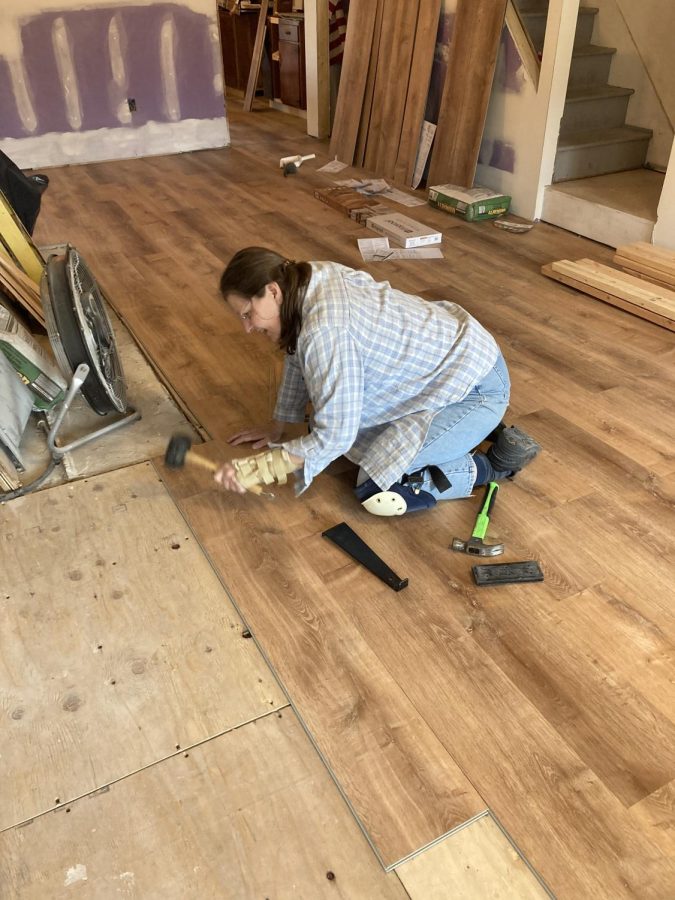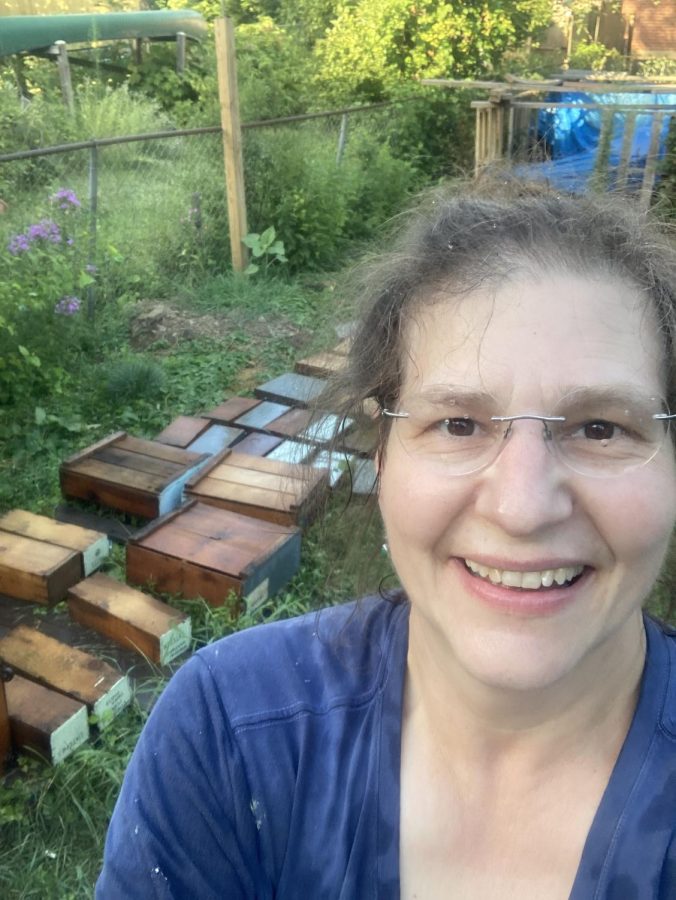Also see: Disaster Relief and Recovery After Flooding in Lambertville
Clouds gathered in a gloomy sky as Bucks Language and Literature Professor Charlie Groth looked out her study window and watched a wall of rain move across Lambertville, NJ. Groth wondered if the deluge would swell the banks of the flood-prone Delaware River.
It did. On the night of Wednesday, Sept. 1, 2021, Lambertville suffered the worst flash flood in its history, resulting in a swath of devastation that badly damaged Groth’s home and many others. She’s been rebuilding ever since.
“We didn’t know what we were in for,” she recalled.
Usually when there’s heavy rain, Groth visits her field site at the Lewis Fishery in Lambertville, the last haul seine American shad fishery on the nontidal Delaware, according to Groth’s book, “Another Haul: Narrative Stewardship and Cultural Sustainability at the Lewis Family Fishery.”
Still in the midst of the COVID pandemic, Groth had just finished running a program on zoom, when she heard drops drumming against her roof and called the fishery. Groth, who usually brings in netting and other equipment from the Delaware after heavy rain, did not have to that day, despite the Delaware’s tendency to flood. She moved on to feed her four pets, three cats and one dog.
Then Groth heard the shrill sound of a severe weather warning blaring through her phone. Gov. Phil Murphy declared that New Jersey had entered a State of Emergency in response to Tropical Storm Ida. Groth grabbed her pets and sheltered in her downstairs bathroom as several inches of rain pounded the home she had bought 11 months earlier.
Groth had been busy renovating, spending months replacing the beam that held up the house, removing sky lights, replacing roofing and flooring. This house was “my second chance house,” she said.
The renovations ultimately prevented her home from caving in during the flood. “It was the difference between losing my living room floor and my entire home, as boring and expensive as it was.”
Following a series of tornado warnings, Groth continued to shelter and watch the rain pour over the windows. “Drip, drip, drip.” Groth peeked around the corner to find the rain being pushed between her windows’ molding and splashing inside the house. She grabbed the dog bowl to catch the rain, but it quickly filled. Wondering what other damage she might find, she inspected the basement.
Water gushed out of the walls and covered the basement floor. Groth watched as the water rose inch by inch while she devised a plan to shut off her gas and electricity. Floating across her flooding basement, Groth turned off her electricity, and was in the dark.
“It was extremely disorienting.” Groth had lost some of her antiques, furniture, and her guitar.
After a lull in the rain, Groth stood on her porch watching water rushing between her and her neighbors’ houses. “We didn’t know where all our neighbors were, some of them were in their cellars thinking they were going to die, some of them couldn’t even make it home.”
A huge deluge quickly came down and Groth was pushed back inside her home. Just around 8 p.m. while on the phone with her daughter, the professor noticed the water come up through the cellar floor into the living room.
Groth grabbed a box of her kids’ baby photos and brought her pets into the bedroom. As Groth sheltered in place on her second floor, she could hear her fridge and furniture tumble over, and people yelling to be rescued in the apartments behind her home.
She headed to her stairs to watch the rising water. There was a little over two feet of water in the living room, just over the windowsills. By 11 p.m. the floodwaters were receding, aside from a small stream between the houses on her street.
It was a Wednesday night, so Groth headed across the street to use a neighbor’s Wi-Fi because she still had work to do for that night. When people trapped in the apartments behind her home were being rescued in boats around midnight, she finally went to sleep.
The flood was a blur to Groth. “The flood had psychological effects on so many people in so many different ways.”
According to the Bucks County Herald, over 1,000 homes and businesses were left without power, and at least 25 families were displaced from their homes due to the severity of the flooding.
After the one-year anniversary of Hurricane Ida and Lambertville’s flooding, Groth reflected on her experience. When she began the difficult process of cleaning her house after the flood, she saw her “whole life on the curb.” To this day she finds pieces of her kitchen wall outside of her home.
Everything in her basement was destroyed, but Groth says she “never felt alone.” Neighbors came together to help each other, spending hours cleaning up the devastation caused by the rain. People Groth did not even know would help her during the cleaning process.
Her street “became a festival” as residents and businesses owners picked up the pieces. A social worker put flowers on each home’s doorstep as individuals walked around handing out food and water. As much as there was to do cleaning up and digging, it gave Groth the opportunity to connect with people in her community.
This September Groth and her neighbors gathered once again, this time to observe the flood’s one year anniversary. “People were laughing, people were crying.” The Lambertville residents’ perseverance made it possible to survive and recover from this unforgettable flood.
“You have this devastating thing happen to you, but you also have this wonderful outpouring of help and kindness,” she said, adding: “I would look around and see people from all parts of my life there who didn’t know each other but were there to help.”
After Labor Day Groth realized there was no way she could teach from home, so she moved in with a friend. Groth lived at her friend’s house for nine months during her home’s reconstruction.
After six weeks Groth expected to return home, but things did not goes as planned. Groth spent Christmas displaced, celebrating around an non-traditional Christmas tree, which stood in her friend’s front yard. Rather than purchasing a Christmas tree, to save time, she and her friend decorated the window around a tree which already stood outside.
Repairing her home was enormously time-consuming. The walls needed to be pulled down, the floors were rotten, the upstairs became covered with mud and dust. “The hardest thing to replace is free time,” Groth said.
“Our lives are so complex they’re hard to put back together and yet we can.”
The reconstruction was exhausting, but with the support of her community, it was possible.
“You can come out of this traumatic thing that happened to you feeling grateful.” Groth says people would bring her food and gift cards, and someone even did her laundry for nine months. “I could not have gotten through this without kind friends and strangers.”
“There were all these wonderful people donating time, donating supplies.” Groth received support from friends, strangers, and even her Bucks colleagues. Professor Matthew Metcalf helped Groth rebuild her kitchen floor, Professor Sharon Estes and her three children cleaned fine china, and Professor Ryan Fealy assisted in removing a shed, among many others who donated gifts, cards and time.
Today, Groth is back at home and just finished washing the last of the furniture, though there’s “still a big to-do list.” Even so, Groth says the historic Lambertville flood has been “a fresh start on my fresh start.”
Though her home fell victim to the Hurricane Ida, it is now rebuilt the way the professor wants it to be. Groth repaired the damage, rebuilt with significant efforts to mitigate any future flood damage, and even repurposed green cabinets from Facebook marketplace.
Though Groth lost parts of her home, she says it is so much stronger and so much safer now. “I’m stronger, the house is stronger, and the community is stronger.”



